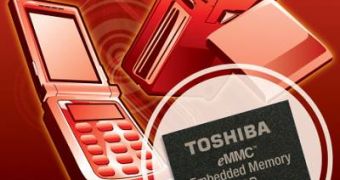Toshiba and Samsung have announced that they have passed to each other the rights to produce and sell products that are trademarks of either companies. Through this agreement, Toshiba may market Samsung's OneNAND technology, while Samsung can benefit from Toshiba's LBA-NAND memory chips. Cross-licensing would result in the availability of high-performing OneNAND and LBA-NAND flash devices and, at the same time, would offer OEMs a broad range of suppliers for each premium memory chip, in order to avoid the risk of running flat when a producer encounters production blockages.
Masaki Momodomi, Flash Memory Technology Executive of Toshiba Corporation's Semiconductor Company, said, "Signing this agreement will provide a major boost for market development and we believe it will trigger substantial new growth. It will allow our customers more options - both in terms of high performance technologies and suppliers. We believe that this agreement will bring positive results to the industry as a whole."
Samsung is committed to licensing Toshiba with their integrated OneNAND and Flex-OneNAND "fusion" memory chips specifications, while Toshiba will release to Samsung their LBA-NAND and mobileLBA-NAND flash chips parameters. Samsung's OneNAND and Flex OneNAND are fusion chips that feature a NAND core, as well as error correcting engines and other circuitry, all compacted into a single chip unit. Toshiba's technology is built around a controller and a NAND flash memory unit. The LBA-NAND is dedicated to mobile devices, such as digital audio players and portable media players, while the mobileLBA-NAND chips suit mobile telephony best.
Yun-Ho Choi, senior vice president of the Flash Team at Samsung Electronics' Semiconductor Business, said, "The advanced performance specs and easy design-in features of the NAND flash memories to which the agreement applies can greatly improve design options for CE application designers, while reducing development costs. Samsung will place additional priority on meeting the anticipated growth in demand for high-performance NAND flash in mobile and other consumer applications through the provisioning of more diverse NAND solutions and peripheral interfaces."

 14 DAY TRIAL //
14 DAY TRIAL //